Talking With Tech AAC Podcast
Technology
Episodes
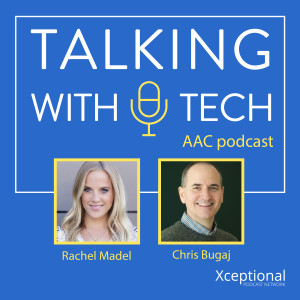
Thursday Mar 05, 2020
Thursday Mar 05, 2020
This week, the TWT team presents Chris’s roundtable discussion on coding, robots, and AAC with Darla Ashton, Brian Franklin, Catherine Brown, Kelly Fonner. They discuss practical strategies for teaching language using the Dash robot, Ozobot, Code.org, the Every Move Counts method, and more!
Before the roundtable, Rachel and Chris share about meeting each other for the first time in PA during the previous winter break. Rachel also describes going to a screening of Uncut Gems and meeting Adam Sandler! Finally, Rachel and Chris talk about the challenges and rewards of networking, and how they have both become more comfortable with criticism!
Key ideas this week:
🔑 It is important to be ourselves when interacting with others, especially when networking. While not everyone will be interested in us when we are ourselves, the connections we do make are stronger when we are authentic!
🔑 Coding and working with robots is a great way to work on core vocabulary (e.g. “go here”)
Robots can be more age appropriate for students in school, especially middle and high school
🔑 Coding can encourage peer interaction, because coding robots is motivating to many students, and it allows robotics teams and students in special education to work side by side.
If you love Talking with Tech, help us develop new content and keep the podcast going! Support our podcast at patreon.com/talkingwithtech!
Visit bit.ly/twtpod for access to previous episodes, resources, and CEU credits that you can earn for listening to TWT episodes!
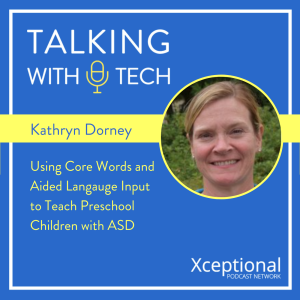
Wednesday Feb 26, 2020
Wednesday Feb 26, 2020
This week, TWT presents Rachel’s interview with Kathryn Dorney of AAC for the SLP! Before the interview, Rachel shares about a young client she is working with whose family was modeling using Rachel’s free communication board before their first session!
Key ideas this week:
🔑 Kathryn Dorney discusses her recent research with Karen Erickson investigating attributing meaning to behaviors, using aided language input, and core vocabulary for preschool students with ASD.
🔑 For aided language input to be more successful, you need core words so that the communication partners have access to more of the words they use themselves. You can also teach intent better with core words - nouns often don’t indicate the intent of the speaker, but core words do.
🔑 When implementing AAC, we should encourage development, not performance. It can quite a while for some students to learn to communicate, and if we require early success to continue implementation, some students don’t get enough time to learn.
If you love Talking with Tech, help us develop new content and keep the podcast going! Support our podcast at patreon.com/talkingwithtech!
Visit bit.ly/twtpod for access to previous episodes, resources, and CEU credits that you can earn for listening to TWT episodes!

Wednesday Feb 19, 2020
Wednesday Feb 19, 2020
This week on TWT, we present part 2 of Chris’s interviews from ATIA! Before the interviews, Chris shares even more stories from ATIA. There were two “smackdown” sessions which focus on sharing strategies. biy.ly/appsmack20 gives you links to all of the apps at the App Smackdown, and bit.ly/pdsmackdown20 links to all the strategies discussed at the Professional Development Smackdown. Chris also shares about the AAC Certification town hall, poster sessions on AAC camps, using robots to teach language, updates to the AAC Agreements ranking the evidence behind them, and more!
Interviews this week:
🔑 Jeanna Antrim & Maggie Judson from BASSC share about their session on building capacity and supporting staff with implementation, strategies, and supports. Building capacity includes empowering families and increasing the AAC knowledge of educators and administrators. To build capacity, Jeanna and Maggie use the Power:AAC modules to create a learning community, hold monthly AT meetings with administrators, and host family AAC nights. Jeanna and maggie discuss the McNaughton et. al. (2019) article on building capacity, the Nate Network that connects AT specialists in Education, and other great resources!
🔑 Susan Todd & Laura Vaughan discuss why AAC assessment should not be a pass/fail test, but rather a dynamic assessment that occurs over a number of sessions. Family involvement should also be central to the assessment process whenever possible. They also discuss the Dietz et. al. (2012) article that describes seven aspects of AAC assessment for each assessment - Multi-Modal Approaches, Communicative Assessment, Symbol Assessment, Device Trials, Access Method, AAC Instruction, and Personalization. There is no hierarchy of mastery - it is a circle that changes for each individual.
🔑 Marlene Cummings shares about her presentation on breaking through barriers to AAC implementation utilizing the participation model from Beukelman & Mirenda. Barriers discussed include attitude, skill, practice, policy, and knowledge.
If you love Talking with Tech, help us develop new content and keep the podcast going! Support our podcast at patreon.com/talkingwithtech!
Visit bit.ly/twtpod for access to previous episodes, resources, and CEU credits that you can earn for listening to TWT episodes!
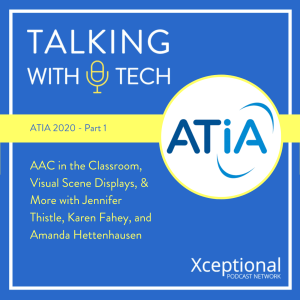
Wednesday Feb 12, 2020
Wednesday Feb 12, 2020
If you love Talking with Tech, help us develop new content and keep the podcast going! Support our podcast at patreon.com/talkingwithtech!
This week on TWT, we present part 1 of Chris’s interviews from the Assistive Technology Industry Association Conference 2020! Before the interviews, Chris shares some stories from ATIA, including not wanting to be “Creepy Chris” when he saw someone he thought he recognized, having FOMO over all the sessions he couldn’t attend, and how much everyone was talking about about literacy at the conference. Chris also talks about the super fun “AT Family Feud” he helped produce!
Interviews this week:
🔑 Jennifer Thistle, Professor at Western Washington specializing in AAC, whose research includes the importance of motor planning and the design of Visual Scene Displays. Visual Scene Displays (VSDs) are photographs with vocabulary embedded into the picture. Jennifer is also asking for feedback from current school-based SLPs who have been working for at least three years and have a student who uses AAC. You can fill out this Google Form and contact her at jennifer.thistle@wwu.edu
🔑 Karen Fahey - graduate student at California State University, Northridge who is interested in AAC & assistive technology. Karen talks about her experience at ATIA, including her favorite parts of the exhibit hall and how much she enjoyed being around other people who are interested in AAC, and also shares about her experiences in grad school.
🔑 Amanda Hettenhausen - SLP & Saltillo consultant talks about how to use AAC in the classroom and adapt books for reading with an AAC user. She shares tips and tricks she uses, including making simple and natural powerpoint books, printing icons on address labels to label books, and more!
Visit bit.ly/twtpod for access to previous episodes, resources, and CEU credits that you can earn for listening to TWT episodes!

Wednesday Feb 05, 2020
Wednesday Feb 05, 2020
This week, we have the privilege of presenting Rachel’s interview with Hannah Foley, a senior at University of Illinois who is pursuing a career in Assistive Technology & AAC. Hannah has cerebral palsy and is an incredible adult AAC user who works as an ambassador for Saltillo!
Before the interview, Rachel & Chris talk about Christine Derse’s article, A Call for Consistency in AAC Picture Systems. Rachel and Chris discuss their agreement that using different symbols sets can be confusing at times, but note it isn’t clear a universal symbol set would lead to better modeling. For example, adults often use labels, rather than pictures, when modeling, and once a motor plan is in place the pictures become less important.
Key ideas this week:
🔑 Initially, Hannah was against using AAC because she felt her dedicated device was unsightly and it made her feel even more different. Working with Matt Baud, she came to see the importance of communication for her independence and started using an iPad.
🔑 Response time is incredibly important when communicating with an AAC user - it is critical that we give enough time to respond and become comfortable with silence.
🔑 People often assume that Hannah is intellectually impaired, can’t go to college, or manage her care independently because she uses AAC. This is, of course, totally incorrect!
We need help from our listeners to keep Talking with Tech going - please support our podcast at patreon.com/talkingwithtech.
Visit bit.ly/twtpod for access to previous episodes, resources, and CEU credits that you can earn for listening to TWT episodes!
Resources
Hannah Foley's blog post - Overcoming AAC Resistance: Communication is Key.
Schlosser, R. W., Brock, K. L., Koul, R., Shane, H., & Flynn, S. (2019). Does Animation Facilitate Understanding of Graphic Symbols Representing Verbs in Children With Autism Spectrum Disorder?. Journal of Speech, Language, and Hearing Research, 62(4), 965-978.

Wednesday Jan 29, 2020
Wednesday Jan 29, 2020
We need your help to keep Talking with Tech going strong! If you are a loyal listener, please support our podcast at patreon.com/talkingwithtech.
This week, Chris and Rachel talk about Chris’s takeaways from the Future of Education Technology conference, a place for teachers, coaches, and administrations can learn about ed tech, including using tech to increase inclusion.
🔑 E-sports was a big topic of discussion at FETC. E-sports allow for more inclusion because students who cannot participate in traditional sports can still play video games. Students can collaborate and interact in an authentic way with peers in a team environment and participate on twitch.com
🔑 The FETC keynote speaker Daniel Pink who discussed the relationship between timing and performance. You want to do analytical tasks in the morning and the afternoon is the “trough” which is better for more routine tasks. We can help students with low motivation to perform better by scheduling them in the morning.
🔑 Carol Allen talked about early childhood education and introducing students to educational technology at a very early age. Don’t be the “lid on the flea jar”, as seen in this video (https://youtu.be/v-Dn2KEjPuc), by setting low expectations for students.
🔑 Jane Odom talks with Chris about the new “voice control” feature on Apple iOS where you can use a real or synthesized voice to interact with everything on an iOS device. This has opened up opportunities for AAC users to become more independent in exciting ways!
Visit bit.ly/twtpod for access to previous episodes, resources, and CEU credits that you can earn for listening to TWT episodes!

Wednesday Jan 22, 2020
Wednesday Jan 22, 2020
We need your help to keep Talking with Tech going strong! If you are a loyal listener, please support our podcast at patreon.com/talkingwithtech.
This week, Chris interviews Matt Levac of ACCEL and David Reno of Southwest Human Development about making assistive tech and developing the “Makers of Change AT Challenge”. Matt and David discuss why making AT for each child can be so important, how recent technology like 3D printing has changed AT making, and how they leveraged the technical expertise of local students through the “Makers of Change AT Challenge” to solve real problems for people with disabilities.
Before the interview, Rachel and Chris connect about getting clients to communicate with carrier phrases and doing fun and silly activities to engage students. They also discuss their experience finding their creative flow in therapy or writing, and how it can be a powerful way to produce a great deal of creative content.
Key ideas this week:
🔑 The Makers of Change AT Challenge takes advantage of the technical skills of students to work on real-world problems facing people with disabilities. One year, students integrated internet-connected sensors into equipment so therapists could get better data about how equipment is being used.
🔑 The Makers of Change AT Challenge is looking for teams across the country to get involved next fall to work on the challenges independently and send in their solutions remotely. Learn more at Atmakerschallenge.com.
🔑 Access free AT resources and “Open AT” solutions at www.makersmakingchange.com and atmakers.org.
Visit bit.ly/twtpod for access to previous episodes, resources, and CEU credits that you can earn for listening to TWT episodes!
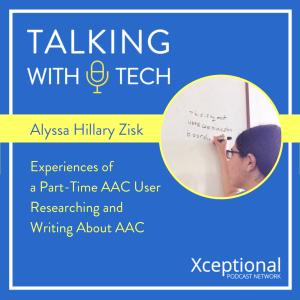
Wednesday Jan 15, 2020
Wednesday Jan 15, 2020
We need your help to keep Talking with Tech going strong! If you are a loyal listener, please support our podcast at patreon.com/talkingwithtech.
This week, the TWT team is excited to share Rachel’s interview with Alyssa Hillary Zisk, an Autistic adult who is a “part-time AAC user” and a previous guest of the pod! Part-time AAC users have the ability to communicate verbally, but there are times when verbal speech is difficult and non-verbal communication is preferred.
Before the interview, Rachel shares about all of her new technology she purchased recently, and shares tips on using an Apple Pencil to become more organized and use less paper in therapy!
Key ideas this week:
🔑 Alyssa discusses their new article, “Am I the Curriculum?”. They discuss how and why being a part-time AAC user, taking an AAC course, and doing AAC research was “systemically awkward” because of many inconsistencies in the field, including our definitions of AAC and who uses AAC.
🔑 Parents may be resistant to AAC because want their child to use verbal speech, but we should empower individuals to use whatever communication method they find beneficial in that moment.
🔑 Alyssa prefers identity-first language (Autistic adult) rather than people-first language (person with autism) when talking about their autism. This perspective is not always respected in the field of AAC - in fact, some AAC journals refuse to accept submissions with identity-first language, even when the author is talking about themselves.
Visit bit.ly/twtpod for access to previous episodes, resources, and CEU credits that you can earn for listening to TWT episodes!
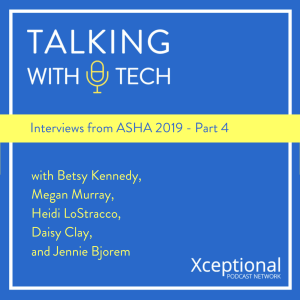
Wednesday Jan 08, 2020
Wednesday Jan 08, 2020
We need your help to keep Talking with Tech going strong! If you are a loyal listener, please support our podcast at patreon.com/talkingwithtech.
TWT presents the last, but not least, collection of interviews by Rachel recorded at ASHA 2019! Before the interviews, Rachel and Chris talk about some gems from Chris’s upcoming presentations at FETC about inclusive design, flexible learning spaces, and teaching through coding with robots. They also chat about ATIA, where Chris will be doing a pre-conference on writing, an “AT Feud” Family Feud style game, an assistive technology strategy “smackdown” session, and more! Afterwards, we hear from our interviews:
🔑Betsy Kennedy and Megan Murray talk about their poster session about how students learn with a consistent core word system across classrooms. They found that two core words a month, with a different focus each of the two weeks covering the same word, was more successful that focusing on one word each week or one word in a month.
🔑Heidi LoStracco shares about Speak for Yourself and their new “Smart Search” feature that remembers the words that have been searched but were not on the system and allows you to quickly add those words later when editing.
🔑Daisy Clay, the author of “Super Core” for the AAC system “SmartBox” shares about how the research behind Super Core, and how it provides both a static set of core words and a dynamic set of context- or activity-specific words on the right.
🔑 Jennie Bjorem, an expert on Childhood Apraxia of Speech, talks with Rachel about helping children with CAS, red flags for making a diagnosis of CAS (e.g. inconsistent errors, consonant & vowel distortions, intrusive schwa, difficulty with multisyllabic words, prosody issues, slow rate), becoming more comfortable with making a CAS diagnosis as an SLP, and more!
If you haven’t gotten a chance to read it yet, check out Chris’s amazing book on assistive tech, “The New Assistive Tech: Make Learning Awesome for All”!
Visit bit.ly/twtpod for access to previous episodes, resources, and CEU credits that you can earn for listening to TWT episodes!

Wednesday Dec 25, 2019
Wednesday Dec 25, 2019
This week, we are happy to share the Xceptional Podcast Network’s 2019 Holiday Episode!
To start off the episode, Mai Ling Chan of the Xceptional Leaders podcast talks about working with her new co-host, Martyn Sibley, and her new book “Becoming an Xceptional Leader.” Brandon Seigel talks about getting started with his new podcast, the Private Practice Survival Guide. Chris and Rachel (aka “Crachel”) share about being busy with lots of presentations and clients. Matt Hott talks briefly about the upcoming 100th episode of the Speech Science podcast and his son’s love of Lego games. After these introductions, the XPN crew play a fun holiday quiz game. Finally, the XPN crew share about their goals for the new year.
From Chris, Rachel, Luke, and Michaela - have a safe and happy holidays!